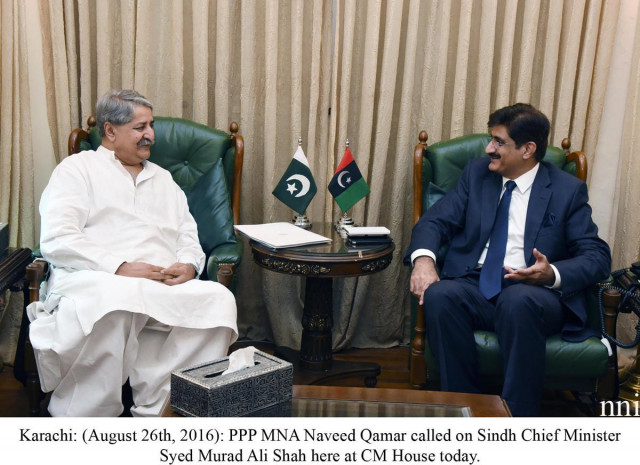Federal govt ignoring Sindh’s list of 93 problematic seminaries: CM
Shah discusses success of Karachi operation, power and gas shortage in the province

A file photo of Sindh Chief Minister Syed Murad Ali Shah. PHOTO: PPI
“There were suspicious activities occurring inside the seminaries. We handed over a list to the federal government to put these seminaries on the watch list but nothing was done,” he said while addressing a 23-member delegation of the Foreign Service Academy led by its director-general Iftikhar Aziz at CM House.
“We did our job but unfortunately the federal government is unwilling to proceed with action,” he lamented, adding that Sindh has long been known for its progressive politics, religious tolerance, pluralism and vibrant civil society but, like other parts of Pakistan, it has undergone a change and is not immune to security challenges.
Sectarianism, infiltration of terrorists, vulnerability of shrines, smuggling of arms and enemy intelligence networks were among the challenges faced by the province, according to the CM.
Karachi operation
Shah said it would be useful to take 2013 as the point of reference, as it was the year in which the Karachi operation began. “There were security and public order challenges [in the city] as well as polarisation on ethnic and sectarian lines. Militants had sought shelter in political and religious parties, criminal gangs had established their sway and no-go areas had emerged where organised crimes on a mass scale such as targeted killings, terrorism, kidnappings for ransom, extortion and street crime had developed,” he said.
Sindh can produce 5500MW electricity from renewable energy: CM Murad
He said the Karachi operation was the government’s response to the problems. Under the operation, the Rangers were granted special powers under Article 147 of the Constitution and the Anti-Terrorism Act, 1997 and deployed in the city. Intelligence-based, well-coordinated operations were launched and it proved so effective that without bloodshed of any innocent person terrorists and criminal gangs were busted, he said.
“It was a unique operation in that on one hand the police and Rangers were conducting an operation, searching homes, and on the other people continued with their normal lives,” said Shah. The CM added that the government has also been revamping the criminal justice system, started political reconciliation and started reconstruction of the city.
Home Secretary Qazi Shahid Parvaiz said that from September 2013 to date the police arrested 1,557 terrorists and killed 424. In addition to this, 152 kidnappers were arrested and 38 killed, 725 extortionists were arrested and 25 killed. Parvaiz said 3,161 murderers were arrested and 1,258 killed. Sindh Inspector-General of Police Allah Dino Khawaja added that 128,218 other criminals were also arrested and 1,285 killed during this time period. “We have recovered 592 kilogrammes of explosive material, 28,249 weapons and 610,826 rounds of ammunition,” he disclosed.
Police finances
The CM also claimed that his government had strengthened the police department financially. “We have provided equipment and vehicles to the police and have made meritocratic recruitments. The newly recruited policemen have been given army training and their morale has been raised with the introduction of welfare and incentive programmes,” Shah said.
Will take action against NAB if it interferes in Sindh govt affairs, warns CM Murad
Talking about the police budget, the CM said it has increased exponentially. In 2013-14 it was Rs51.01 billion and increased to Rs81.11 billion in 2017-18. “This shows our commitment to keep the people of the province safe and secure,” he remarked.
Power, gas shortage
Speaking about development, the CM said 30% of the province’s population is not connected to the national grid. The shortage of electricity in Sindh has reached 1,200 megawatts and the shortfall of gas supply has reached 180 million cubic feet per day. Therefore, the provincial government has taken some policy initiatives, announced Shah. He said they will tap alternative energy sources such as wind, solar power, bio-energy, hydro, develop Thar coal infrastructure and establish the Sindh Transmission and Dispatch Company.
Discussing the poverty reduction programme, the CM said that in 2008-09 a union council-based poverty reduction programme was started in four districts at a cost of Rs5.37 billion. The programme was expanded to six districts in 2016-17 at an additional cost of Rs4.19 billion. The European Union also launched a five-year programme in eight districts at a cost of €70 million. In short, the poverty reduction programme benefited over 750,000 households, he told participants of the meeting.
Shah also said the Nutrition Support Programme was begun with the assistance of the World Bank at a cost of Rs4.12 billion in nine districts, including Tharparkar. He added that the United Nations Maternal and Child Nutrition Stunting Reduction Programme has also started in Ghotki, Khairpur and Naushero Feroz at a cost of $20 million. Another European Union-funded improved nutrition programme has been launched in eight districts at a cost of €60 million.



















COMMENTS
Comments are moderated and generally will be posted if they are on-topic and not abusive.
For more information, please see our Comments FAQ